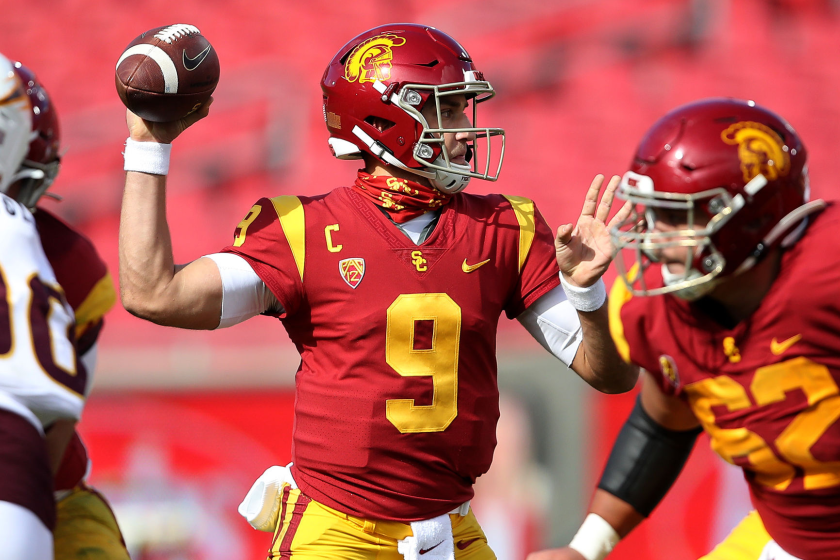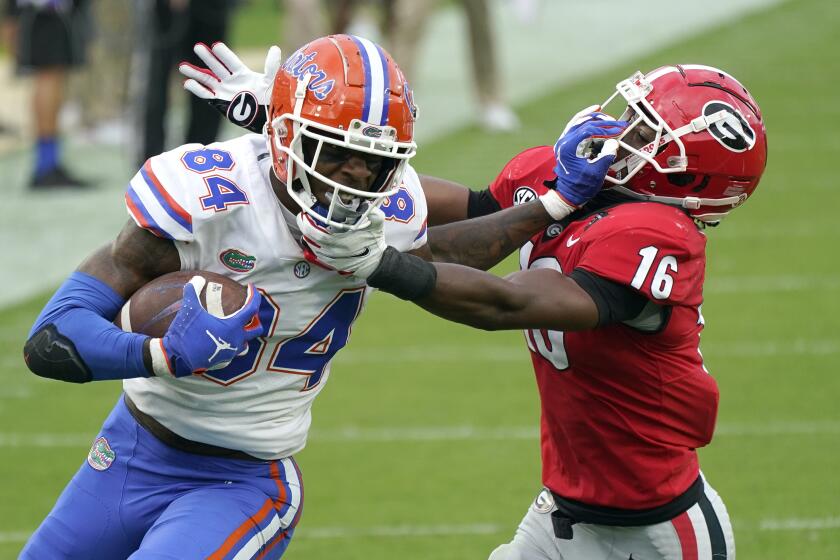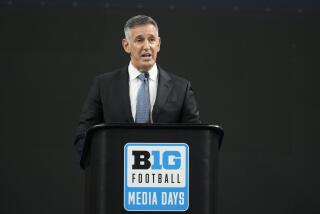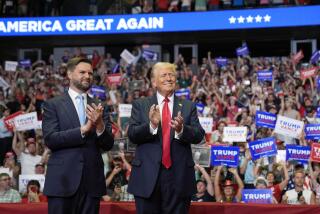Commentary: Trump’s Big Ten football bet didn’t pay off as key states voted Biden

In a year when the surreal became status quo, few moments stick out as truly unbelievable. One such experience came in September, when college football reporters were invited by the White House to attend a call relating to President Trump’s impact on the Big Ten’s decision to reverse course and play this fall.
The president’s aides, who included Andrew Giuliani, son of Rudy and a sports advisor of some type in the West Wing, pushed the story that the Big Ten would not have chosen to restart its season in the midst of a global pandemic without the encouragement of President Trump, who talked with Big Ten Commissioner Kevin Warren. White House staffers supposedly combined to make hundreds of calls to players, parents and coaches to help punch the ball over the goal line.
It was easy to see why the president, who was showered with applause last season when he attended the Louisiana State-Alabama game in Tuscaloosa, Ala., and the College Football Playoff championship between LSU and Clemson in New Orleans, was suddenly seeking out new admirers in Big Ten Country. He won in 2016 thanks to Wisconsin, Michigan and Pennsylvania by flipping them from blue to red, and he would almost certainly need those states to stick with him in 2020.
USC recovers an onside kick late in the fourth quarter before Drake London scores on a 21-yard touchdown pass from Kedon Slovis to defeat Arizona State.
On Sept. 30, during a heated debate with Democratic nominee Joe Biden, President Trump actually claimed, “I brought back Big Ten football.”
This week, President Trump’s Hail Mary heave in the heartland fell incomplete. Biden won seven of 11 Big Ten states, mounting a methodical late march through Wisconsin, Michigan and Pennsylvania on the strength of mail-in ballots.
Given how poorly this season has gone for the schools in those states since the Big Ten kicked off Oct. 23, it’s possible the plan backfired. The Badgers, who play in a COVID-19 hotbed, got one game in before the coronavirus ravaged the roster, forcing the cancellation of their last two games.
Fans of the Michigan and Pennsylvania schools saw enough through two weeks to wish there wasn’t a season. Michigan State lost at home to Rutgers in its opener and, the next week, Michigan fell to the Spartans. Penn State was upset by Indiana and then fell to Ohio State.
Saturday only confirmed a miserable 2020 prognosis for all three, with Michigan State being blown out 49-7 by Iowa, Michigan losing to Indiana, 38-21, for the first time since 1987, and Penn State pulling a total no-show in a 35-19 loss to Maryland.
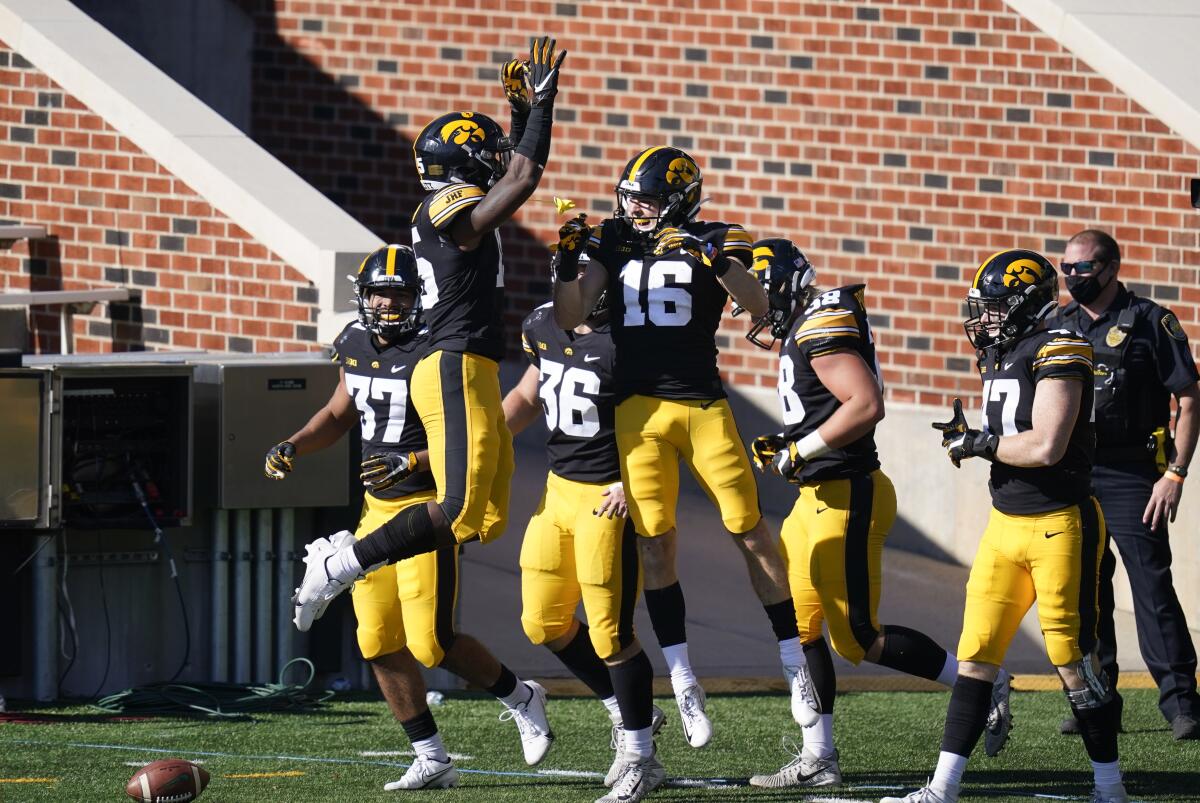
President Trump was eager to take credit, so now surely he can shoulder the blame for the football sorrow within Biden’s freshly repainted “blue wall.”
On Saturday, presidential politics and college football could not be separated. Many college football fans learned the election had finally been called in Biden’s favor on ESPN College GameDay, where host Rece Davis read off the news before quickly shifting back to the football topics of the day.
Of course, there was no mention of the fact that nearly 40 games, played by unpaid amateurs, were going to be staged on the worst day for new coronavirus cases nationally since the pandemic began eight months ago. Ten games were postponed or canceled because of the virus, including the Pac-12 opening weekend offerings of Washington-California and Utah-Arizona.
College football — made up of teams from mostly public institutions that have to manage local and regional politics — can often serve as a metaphor for America. The president wanted sports back as the ultimate representation that he wasn’t going to let the pandemic shut down the economy and life as we knew it.
Kyle Trask threw for four touchdowns as No. 8 Florida beat No. 5 Georgia 44-28, while No. 12 Oregon handled short-handed Stanford 35-14 in an opener.
Saturday the Pac-12 began its attempt to recoup as many dollars from its TV contracts with ESPN and Fox as possible. As if two games being canceled wasn’t enough of a foreboding sign, the kickoff of USC-Arizona State on Saturday morning at the Coliseum was delayed by lightning.
The big bet by university presidents and conference commissioners to play college football this fall is going about as well as could be expected under the circumstances. With each week that passes, it becomes more likely that the CFP will be played on time, starting New Year’s Day, and it’s clear a national champion will be crowned.
What won’t happen, though, is the president being able to claim that his role in saving the Big Ten football season was a key to his reelection.
More to Read
Go beyond the scoreboard
Get the latest on L.A.'s teams in the daily Sports Report newsletter.
You may occasionally receive promotional content from the Los Angeles Times.

